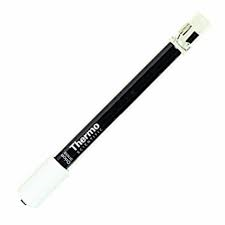
Electrical conductivity is an inherent property of most materials, and ranges from extremely conductive materials such as metals to non-conductive materials like plastic or glass. In between the two extremes are aqueous solutions, such as sea water and plating baths.
In metals, the electrical current is carried by electrons while in water it is carried by charged ions. In both cases, the conductivity is determined by the number of charge carriers, how fast they move, and how much charge each one carries.
Thus for most water solutions, the higher the concentration of dissolved salts, which will lead to more ions, the higher the conductivity. This effect continues until the solution gets too crowded, restricting the freedom of the ions to move and the conductivity may actually decrease with increasing concentration. This can result in two different concentrations of a salt having the same conductivity.
Conductance is defined as the reciprocal of resistance and is measured in Siemens (S), which was formerly referred to as mhos. Conductivity is an inherent property of any given solution and is derived from conductance by the geometry of the measuring cell. A measurement results in the conductance of the sample and it is converted to conductivity. This is done by measuring the cell constant (K) for each setup using a solution of known conductivity.
Documentation
 Conductivity Cells
Conductivity Cells